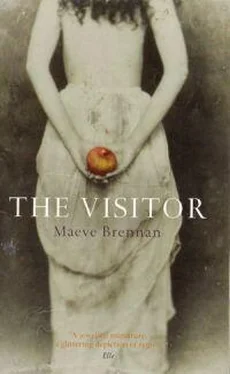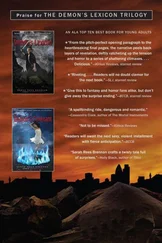Maeve Brennan - The Visitor
Здесь есть возможность читать онлайн «Maeve Brennan - The Visitor» весь текст электронной книги совершенно бесплатно (целиком полную версию без сокращений). В некоторых случаях можно слушать аудио, скачать через торрент в формате fb2 и присутствует краткое содержание. Жанр: Проза, на английском языке. Описание произведения, (предисловие) а так же отзывы посетителей доступны на портале библиотеки ЛибКат.
- Название:The Visitor
- Автор:
- Жанр:
- Год:неизвестен
- ISBN:нет данных
- Рейтинг книги:5 / 5. Голосов: 1
-
Избранное:Добавить в избранное
- Отзывы:
-
Ваша оценка:
- 100
- 1
- 2
- 3
- 4
- 5
The Visitor: краткое содержание, описание и аннотация
Предлагаем к чтению аннотацию, описание, краткое содержание или предисловие (зависит от того, что написал сам автор книги «The Visitor»). Если вы не нашли необходимую информацию о книге — напишите в комментариях, мы постараемся отыскать её.
The Visitor — читать онлайн бесплатно полную книгу (весь текст) целиком
Ниже представлен текст книги, разбитый по страницам. Система сохранения места последней прочитанной страницы, позволяет с удобством читать онлайн бесплатно книгу «The Visitor», без необходимости каждый раз заново искать на чём Вы остановились. Поставьте закладку, и сможете в любой момент перейти на страницу, на которой закончили чтение.
Интервал:
Закладка:
Always, through the winter months, the house and garden remained apart, as though they had been separated from each other. It had been like that since earliest memory. The low stone walls closed in tight around the empty flowerbeds and the patch of grass, now frozen hard, or soggy after rain. The wooden seat near the laburnum tree never dried enough to sit on. If one looked from the house the garden seemed enclosed in hard silence. And yet if by chance one walked to the end of the garden and turned to see, then the house itself had a withdrawn look, a severe incurious aspect. Standing outside in the wintertime one was cut off and left, because the green life in the earth around was discouraged now, or secret, and in any case offered no welcome.
In the kitchen the big oven was kept going from morning till night, and it filled the basement with great comfortable heat. On the worst winter days, and on other days, Katharine brought poor men in to sit at her table and gave them a meal. A lot of poor men and poor women came asking at the basement door. Sometimes they sang outside first, with quick eyes searching the upper windows; or they carefully unwrapped a tin whistle or a violin and played for a while; or they sold shoelaces and pencils; but they were all poor people.
(“Don’t ever say beggar,” said Katharine to Anastasia in a fierce whisper. “He’s a poor man, God help him.”)
People seldom went through the back door that led from the garden into the narrow alley behind the house in wintertime, because the way grew caked with leaves then, and slushy. Errand boys on bicycles used it as a shortcut. They slithered up and down at high speed. They whistled as they went and greeted each other in loud voices.
All the long-ago winters seemed to have disappeared in fire-light. In memory the silent flames played gently from all the small grates in the house, warming the hands and faces of the family. There was Katharine, bending herself down to poke at a stubborn log. And the mother, that pale and most unluxurious person, drawing close to the heat after a walk outside.
With the coming of spring, windows were thrown wide all over the house, and the garden seemed to smile with the new colours in it. The cat waited impatiently for her breakfast on the cement outside the kitchen door, instead of huddling by the warm stove as she did in the cold weather. In the early spring and summer mornings the sun lay clean across the cement outside the door there, and the cat laid her ears back and made the milk fly. There were little creeping insects that came out of the wall to walk in the sun, but Katharine’s broom made short work of them.
Plants were taken out of their pots and planted into the earth, and the red flowerpots were put away till next winter.
Next winter and next winter and next winter. In the mind they passed all slowly, like clouds across a summer sky, but a sudden call or turn of the head and they disappeared in a rush, shuttling quickly one after the last till nothing was left but a strangeness in the mind, a drop of thought that trembled a moment and was gone, perhaps.
Anastasia walked in the park, in front of the house. She walked along the edge path as far as she could go, until she had walked around the whole park twice. Then she changed her direction and went straight into the not mysterious middle of the park, where she found, as she expected, a small stone house, a summer house that contained two long stone benches where nursemaids had been apt to sit in the sunny weather. She went in and sat down.
The summer house was open on all sides, and from where she sat she could see her grandmother’s house. She could feel the silence of it, and she stared at it. This raw cold day the park had been deserted since morning, and now evening was closing quickly in, closing down on the city. She sat there in the cold.
Someone came hurrying around the corner and went straight to the house as she watched. Who could it be? It was a woman and she wore a hat and beyond that there was nothing to remark about her. She had a hand at the doorbell, and Anastasia watching felt the sudden ringing through the house. How astonished they must be. She knew how it sounded. Sudden and loud in the kitchen, where Katharine would at this moment be gathering herself in annoyed surprise for the climb to the hall. Distant and sweet in her grandmother’s room, still more distant in her own room.
I doubt if that bell has rung since I rang it myself the first night home, five weeks ago.
Then she remembered how the door had opened while she was still in the taxicab. That night there had been no necessity to ring the bell at all. Now Katharine opened the door and the visitor stepped in. She stepped into the hall and the door closed on their faces, turned to each other. Immediately the light went on in the sitting room and there they were again, vaguely. Katharine came to the window and drew the curtains. She had her head turned, talking behind her. The light went on in Mrs King’s room. She has roused from her nap, and is coming down. Anastasia pictured her grandmother sitting on the edge of her large bed, touching her hair, fastening the collar at her throat, staring a moment at the floor before starting stiffly into the evening’s activity: tea and the fireside, dinner and the fireside.
Someone came out on the steps. It was Katharine in her big white apron. She waved vigorously at Anastasia. Probably she is smiling. Even if she can’t see me, she knows I’m here. She’s been watching all the time, thought Anastasia, and she looked up high above the roof of the house, up to the deepening sky, to shut out Katharine and her wave and the open door. When she looked again, warily, Katharine was still there, still waving, and the visitor had come to the window and was standing between the curtains looking out.
Anastasia looked at Katharine, waving on the steps. She searched for the spot where Katharine’s eyes, now frowning, might be. She looked straight at Katharine’s eyes and gave no sign at all that she saw her. She did not move. Katharine turned and went into the house and shut the door behind her. In the sitting-room window the curtains fell to. Now she could see the darkness. There were the lonely lights of the street lamps, and a faint gray haze in the air, left over from daytime. That will soon disappear, and the stars will be out full. Not yet a while.
She got up and walked toward the house, back across the park. It was teatime and a little after. She entered the house by a side door and went silently up to her room. Sometime later Katharine tapped on the door. She came in smiling. There was no ill temper in her face. She looked tired and pleasant.
“Your grandmother says will you come down and have a cup of tea with herself and Miss Kilbride. Miss Kilbride wants to see you particularly. You’ll remember her. She’s the only one comes now at all.”
“Oh, I do remember her, very well. My mother was very fond of her. Of course I remember.”
She went to the mirror.
She said, “Nobody comes at all, do they?”
Katharine looked at her with a distant considering eye.
“No one much comes, no. Did you have a nice walk? I tried to catch you earlier, to get you in, but you weren’t looking. Well, do you want your tea? I put on an extra cup for you.”
“I’m coming.”
She went down. The grandmother was in her usual place in her own chair. Facing her was a small wrinkled woman with faded green eyes and astonishing coal black hair, which she wore parted in the middle and drawn into a bun low on her neck. She was smoking, holding the cigarette delicately as though it might explode in her face. She held the cigarette to one side and looked carefully at Anastasia’s legs, and then she looked at her face and smiled affably and held out her hand.
Читать дальшеИнтервал:
Закладка:
Похожие книги на «The Visitor»
Представляем Вашему вниманию похожие книги на «The Visitor» списком для выбора. Мы отобрали схожую по названию и смыслу литературу в надежде предоставить читателям больше вариантов отыскать новые, интересные, ещё непрочитанные произведения.
Обсуждение, отзывы о книге «The Visitor» и просто собственные мнения читателей. Оставьте ваши комментарии, напишите, что Вы думаете о произведении, его смысле или главных героях. Укажите что конкретно понравилось, а что нет, и почему Вы так считаете.











